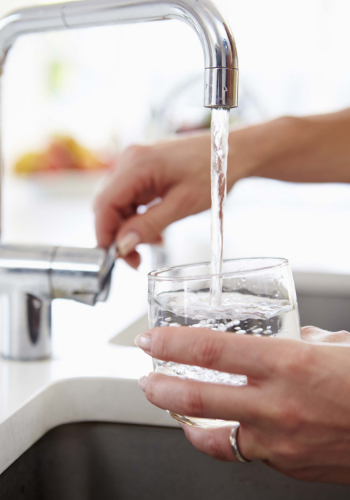- Print |
One of our main objectives is to provide quality water for consumption

Naturally, throughout the day, various Aguas de Alicante departments carry out comprehensive monitoring and control of the quality of the water supplied to our customers and of decision-making.
This enables us to guarantee to our satisfaction that the drinking water supplied by Aguas de Alicante is 'perfectly healthy'.
Tap water is a secure asset. In your home, in businesses or in industry, when the tap is turned on, the water that comes out has a full health guarantee and good organoleptic properties.
The water we distribute reaches homes with a full guarantee of health quality. We can drink it worry-free throughout our lives.
Consumers can drink the water supplied by Aguas de Alicante and use it to cook without any concerns as it has passed all the rigorous controls established by current legislation and health authorities.
The water more than meets the strictest health regulations established by the World Health Organization, the European Union and the health authorities in Spain.
-
Recommendations regarding the installation of devices for tap water treatment
There has been a dramatic increase in the consumption of bottled water and a proliferation of devices for tap water treatment. This has led to the paradox that even in places where the tap water is of suitable quality, like Alicante, people replace it with mineral water or alter it with devices, so that in some cases they end up drinking water of worse quality.
Are these systems really necessary?
Our company considers that generally users do not need to treat or alter the characteristics of the water that comes out of their taps. We are neither for or against, for example, controlled water softening or the installation of other water treatment systems. However, they should only be used in specific cases in which they are really necessary to obtain water with certain physicochemical characteristics.
If these devices are not chosen with care, are not checked regularly, and are not maintained as recommended, they can put health at risk (through contamination with bacteria, excessive demineralisation of water, etc.).
Therefore, devices such as domestic water softeners and reverse osmosis filters do not need to be installed in the home to improve the quality of tap water. The water that comes out of your tap is 100% drinkable and meets all the quality standards established by national and international legislation. Consequently, there is no need for any additional devices to treat the water.
We advise the use of tap water, as it is safest in terms of physical, chemical and microbiological characteristics, and is monitored daily in our laboratory by highly qualified people equipped with the latest material and technological means.
Tap water is more than just water. It provides mineral salts that are eliminated by the organism and need to be replaced. It is important to include these in our diet:
-
Calcium: this is a fundamental constituent of bones and teeth, is necessary for nerve transmission and heart rate, and is a factor that regulates blood clotting.
- Magnesium: with calcium, magnesium regulates muscle contraction and nerve transmission at cardiac level.
- Potassium: participates in neuromuscular function, along with calcium.
- Bicarbonates and sulphates: have digestive properties and can contribute to preventing kidney stones.
- Fluoride: increases the strength of dental enamel and prevents caries.
The consumption of water with a certain average hardness can be beneficial from a nutritional perspective, as water rich in calcium has a positive impact. Calcium binds to oxalic acid in the intestine and is eliminated through faeces. This results in less free oxalic acid being absorbed and eliminated in the urine and potentially forming kidney stones.
Therefore, we can reject the myths and drink tap water, as it is safe and healthy.
The chlorine in tap water is NOT harmful to health The World Health Organization (WHO) indicates that chlorine has no impact on health at the concentrations established in the legislation. The maximum concentrations of this tap water component recommended by WHO and those established by current legislation guarantee that it poses no health risk.
Indeed, chlorination of drinking water is one of the most significant advances in public health. Thanks to its lethal effect on bacteria and other microorganisms, it has helped prevent and eradicate numerous water-transmitted diseases.
The presence of the right amount of chlorine in water after treatment has no health risks and protects the water against potential contamination. It is an indicator of good disinfection.
-
